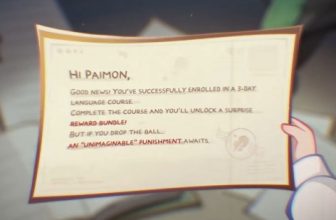
Demonschool review – an afterschool strategy special
Verdict
![]()
Demonschool is a great turn-based tactical game with puzzling combat, dazzling aesthetics, and engaging writing. It can get a bit samey in places, especially in the early game, but for the most part, it’s a delightful demon-slaying adventure that’s sure to be a hit for fans of games such as Fire Emblem, Advance Wars, and other strategy delights.
If there’s one thing I love, it’s a turn-based tactical game. I always have, from my early days of trying and failing to get my head around Advance Wars on my GBA to the countless evenings I’ve spent as an adult strategizing my unit placement in Fire Emblem: Three Houses. So, when I was offered the chance to play Demonschool, a new tactical role-playing game from developer Necrosoft Games with a distinctly gothic vibe, I jumped at the chance.
So, what is Demonschool? Well, it’s a classic end-of-the-world game, but it’s not dystopian; no, you’re experiencing the build-up to the apocalypse. The main character is Faye, who is by no stretch of the imagination a silent protagonist, offering up quips and sass galore when she finds herself on Hemsk Island, attending the local school, to uncover a demonic prophecy. From here, she forms the Black Magic Club with your first friend and party member, Namako, and the investigations into the occult begin.
Before long, the Black Magic Club starts to expand, and the demonic forces get even weirder. Considering the first boss battle is against a tower of possessed PC monitors, that means it gets pretty damn weird. This is all against the background of a ten-week countdown to the aforementioned end of the world, with Faye and the gang trying to balance schoolwork – which you’ll be pleased to hear only really consists of a weekly quiz – and an assignment-of-the-week from the class teacher that always involves something paranormal and a few battles, the real meat of the game.
The gameplay should feel familiar to any fellow tactical fan, but there are a few features thrown in to freshen up the formula. You can take up to four units into each battle, and Faye, the main character, is always locked into the first slot. For the first couple of hours, the battles are a little repetitive, as the game teaches you the nuances of each character, but then it dials up the intensity, leading to some top-tier tactical gameplay.

You have eight action points in each turn, and every character’s first move costs a single point, with a second move costing two points and so on. I love this approach to team-wide stamina as opposed to individual characters, as it truly puts the ball in your court. Sometimes it makes sense to give everyone a turn, whereas sometimes you’re better off just taking Faye and punching your way through lines of enemies and leaving two points to maneuver your other units. Trust me when I say there’s little more fulfilling than ending the ambitions of three demons simultaneously with one special attack.
One of the reasons taking out demons feels so fulfilling is that each turn in Demonschool is split into a planning phase and an action phase. Both phases are pretty self-explanatory; you make your moves when planning and then watch it unfold during the action phase. It feels great to see all your combinations come off, and the more I think of it, the more I realize playing Demonschool feels like playing a puzzle game at times, but there’s no definitive right answer.
The aim of each battle is to take out a specific number of demons before taking at least one player to the end of the battlefield to summon a portal, suck up all the remaining demons, and escape with your life. That sounds pretty simple, but demons spawn in waves, and you can feel confident in one turn before getting completely overwhelmed in the next. There isn’t much enemy variety at first, but the game mixes it up by the end of the first week, and from there on in, almost every combat showdown feels fresh.

In terms of personal highlights, I have to celebrate Demonschool’s design. I love it. The colors are very 80s, and the character models and environments are very 90s, combining for something that feels like a nostalgia trip to a time that never really existed. The soundtrack backs up those retro vibes with a gripping synthesizer-laden score that makes the action even more engaging, and I’m hoping for a separate Spotify release so I can pump these tunes out while doing the vacuuming (though hopefully, without the involvement of demons).
Like a lot of my favorites, Demonschool is a game that clearly takes influence from other greats. The most apparent inspiration is the Persona series. That’s obvious in the day and night cycle, the academic environment, and, well, all the demons. The battle system is reminiscent of games like The Banner Saga, in the best way possible, though it also reminds me of a bunch of other turn-based tactical games, such as Into the Breach and Fire Emblem.
Weirdly, though, despite the clear inspirations, Demonschool feels very much like its own game. I think that’s mostly due to the writing, which is fantastic, as each character feels like they have something to offer to the group dynamic. It’s also funnier than I anticipated, with plenty of witty one-liners and even the odd mom joke for good measure. Admittedly, sometimes it tries a little too hard to get a laugh, but there are more hits than misses.
All in all, Demonschool is a fantastic tactical game that manages to wear its influences on its sleeve without feeling derivative. It can get a bit samey in the early game, but once you’ve gotten through a couple of boss battles, it keeps delivering, perhaps even too much, as this is not a short game, but you won’t be one to complain if you’re as engaged as I was with the narrative countdown.






